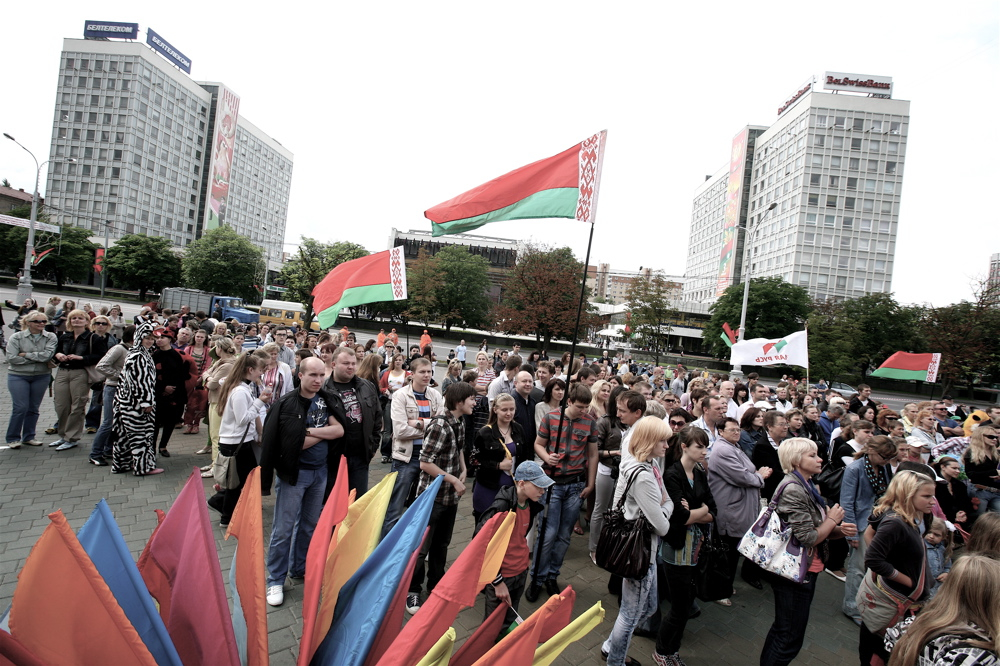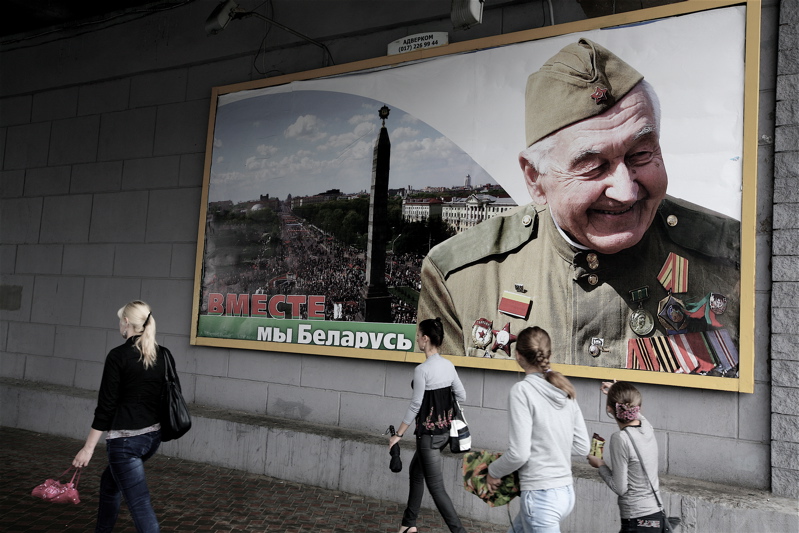
When thousands of angry Belarussians filled the streets in December to protest the sham elections that saw authoritarian president Alexander Lukashenko win a fourth straight term, his response was unusually ruthless. Riot squads charged crowds with batons and stun grenades, injuring dozens as they made mass arrests. Opposition leaders were rounded up and thrown in prison, where some still languish. For months after, the mood was grim. "There was no room to breathe, let alone show how fed up we are with this regime," said Vitya, a 20-year-old university student who spent almost two weeks in prison for taking part in the unrest. "We weren't sure what to do next."
But thanks to the virtual power of social media, a summer of discontent now grips what is often called Europe's last dictatorship. Buoyed by developments in Egypt and Tunisia, and the harsh crackdown that forced him to flee his homeland for Poland, a 24-year-old activist named Viachaslau Dziyanau had a new idea for the protest group he founded in 2009 on a popular Russian social networking site. Flash mobs -- peaceful and wordless -- would meet at the same time and place each week and clap their hands. At best, the stunt might temporarily foil the restrictions against public gatherings; at worst, they would hasten an overreaction that might demonstrate the president's paranoia. The movement became known as the "Revolution Through Social Networks," and quickly amassed more than 215,000 followers online.
Mere hundreds gathered in the street at the first gathering on in early June. The protesters, mostly in their 20s and dressed in trendy clothes, clapped with hesitation, looking over their shoulders to be sure they weren't acting alone. Authorities initially responded by sending plainclothesmen with earpieces out to film participants, some of whom filmed right back with cell phone cameras. As the group held more such gatherings, their ranks grew larger and bolder. It was just a matter of time before Lukashenko, a former collective farm manager who had pledged to "whack" Internet protesters, crashed the party. When security forces were first deployed late last month, the crowds scattered helter-skelter without resistance. Thronged sidewalks were empty within seconds.
In a July 3 address, Lukashenko warned his countrymen not to harbor dreams of "color revolutions" like those that swept other former Soviet republics such as Ukraine and Georgia. His security forces are taking no chances. Last Wednesday, police were already waiting in key protest areas around the capital and in regional centers where smaller rallies have taken place. In Minsk's October Square, groups of thugs razed the crowds and hauled people away, including many journalists, into unmarked buses parked nearby. Some were beaten and kicked on the ground. Rights groups estimate that about 1,900 people have so far been detained by police, with close to 500 receiving heavy fines and short prison sentences on charges of "hooliganism."
"They understand they have enormous power and can do what they want; there is no chance for dialogue," said Rusia Shukiurova, a folk musician and activist. She recalls walking with friends on the periphery of the Wednesday protests when a man with a shaved head in an Adidas tracksuit asked for identification. "Who are you?" she demanded, to which he menacingly replied, "I'm nobody." An argument ensued and a couple of her friends were taken away, but she managed to shake free. "We're sick of living in fear," she added. "It's become so ridiculous."
Following Luskahenko's decree that hand-clapping was forbidden in public unless it was directed at war veterans, spectators took him at his word and his Independence Day speech ended with dead silence. Several days later, an unemployed man from the western town of Grodno was convicted of applauding in public and fined the equivalent of $200, standard procedure save for one detail: He is officially registered as a disabled person and has only one arm. Meanwhile, the government also tried, with limited success, to shut down opposition websites and spread misinformation, going so far as to set up fake Twitter accounts that imitate protest organizers and even foreign journalists.
Last week, protest organizers changed the time of the gathering. Instead of clapping, people were instructed to set their cell phone alarms to 8pm and loiter in the street to generate a collective ring. The gimmick came and went without much fanfare, but it didn't stop humorless authorities from making another round of mass arrests. A spokesman for Belarus' Interior Ministry, Konstantin Shushkevich, would not say how many were detained Wednesday, noting only that Belarussian law allows police to detain any citizen for three hours without a reason. "Whether it's clapping, or ringing telephones, or any other action, is all the same," he told the New York Times. "Any activity being organized in Minsk is an activity of mass disorder."
As the squeeze tightens, more retrograde tactics are coming into play. Activists have started producing homemade DVDs of police brutalities. The faces of some of the worst offenders have been printed on leaflets designed to resemble Wild West-style wanted posters. These are being distributed at night in the mailboxes of working class families, many of whom largely get their news from state-run media and have grown politically passive, implicitly accepting stability ahead of social freedom. Some activists have even started going around park benches in the capital carrying cell phones and laptops showing videos of abuse to rouse the pensioners who frequent them.
Yet for all the youthful energy, many here doubt current protests can sustain their momentum. Although an unprecedented economic crisis that has slashed purchasing power and led to shortages of basic goods has caused rumblings among older generations, Belarus still boasts one of the world's highest ratios of security agents-to-citizens and a vast public sector whose livelihoods depend on a state-controlled economy. Alexander Feduta, a political analyst who helped get Lukashenko elected in 1994 and has since joined the opposition, insists that until a critical mass of the working classes get involved, the current movement is not likely to pose a serious threat to the regime. "This is not enough," he said. "When the factory workers come out, then the revolution will really be on."
On Wednesday, for the ninth week in a row, a couple hundred protesters descended on three locations in central Minsk to clap their hands and stomp their feet. More beatings and arrests followed. No word yet on the Internet as to what's next. For the time being, then, it's up to the young and the restless.



